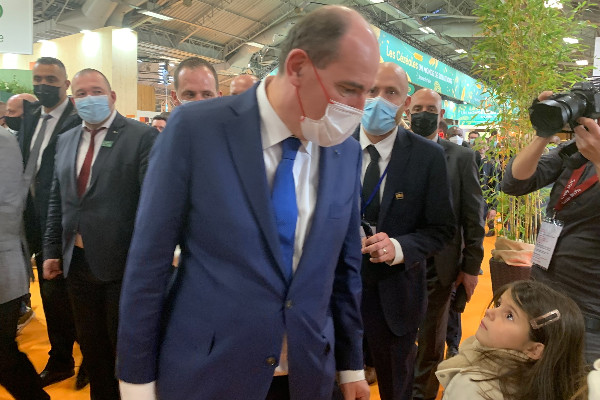The government confirms to the wine sector that the vines will not be considered as an “attractive culture” for bees.
The Prime Minister, Jean Castex, during his inaugural visit to the Salon de l’Agriculture, this February 26 in Paris. On the wine pavilion, he evoked the support of the State for the wine transition like his role as a father bringing his daughter to school, where it was up to her to work. – photo credit: Alexandre Abellan (Vitisphere)
–
–
D
to be published shortly at Official Bulletin of the Ministry of Agriculture, the list of crops that are not considered attractive to pollinating insects will include viticulture. This is announced by the Prime Minister, Jean Castex, and the Minister of Agriculture, Julien Denormandie, during their visit to the wine pavilion on February 26 at the Agricultural Show. Imposing strong time constraints on phytosanitary treatments during the flowering of crops considered attractive, thepollinator decree published on November 21, 2021 was accompanied by a public consultation of the list of crops that can be considered as non-attractive*.
The executive’s announcement confirms this status for the vine. Knowing that as defined in the decree, “An attractive crop is a crop which, by its nature, is attractive to bees or other pollinating insects”. For plants that may be attractive outside the main crop, the text defines that“a foraging area is an agricultural or non-agricultural space occupied by a cultivated or spontaneous plant group, which is of obvious interest to bees or other pollinating insects due to the presence of flowers or exudates” and states that “the uses of products on foraging areas are those intended to specifically treat these areas, independently of the use on crops in production”. Something to clarify the situation for the grassy areas of the plots.
During these exchanges, the government was challenged by the sector on the issues of the regulatory over-transposition that the vineyard undergoes in terms of reducing its inputs. While the vineyard is very involved in the agro-ecological transition, implementing its sector plan, the executive affirms its support for support, while emphasizing that the work of adaptation will have to be done by the vineyard.
*: Including oats, wheat, spelled, lentil, moha, barley, protein peas and field peas, ryegrass, rice, rye, soybeans, triticale Tritordeum and others wheat hybrids.
–
–

